I’ve uploaded a new video on whether natural beauty products are better or safer. This is a topic that’s close to my heart, as it was the reason I started my blog all the way back in 2011 and it was my first science post! So I donned my best natural-themed jacket and recorded this.
Points I cover:
- What exactly is a chemical?
- What’s the difference between natural and synthetic chemicals?
- Are natural ingredients safer?
- Should you avoid ingredients you can’t pronounce?
- Should you reduce the number of chemicals you’re exposed to?
While I was recording the sound I managed to drop my laptop on my head and give myself a concussion, so… yeah. I have terrible coordination!
Also you wouldn’t believe how many takes it took for me to get all those chemical names right.
Let me know what you think! ^_^/
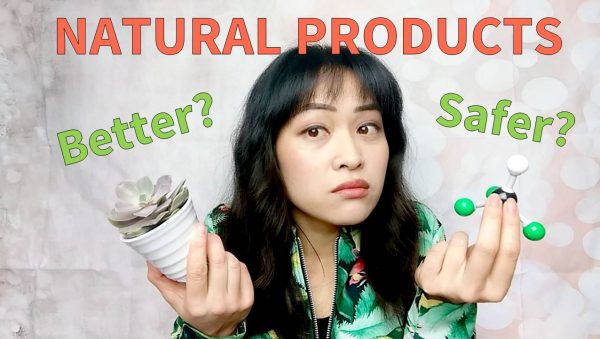


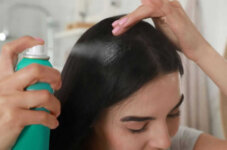
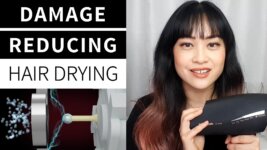
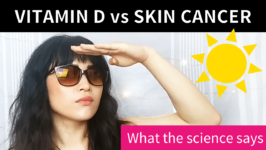
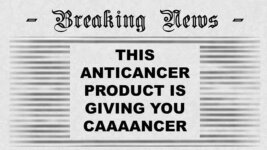
Excellent video! I know so many people that need to watch this!!
The laptop injury paid off. You’re on fire Michelle. This was awesome!
Thank you so much! 🙂
But you cannot really compare a ‘good’ synthetic chemical with a ‘bad’ natural poison. Isn’t the point when it comes to choosing ‘natural’ or ‘naturally-derived’ products that you are only comparing ‘good’ synthetics with ‘good’ natural chemicals and if given the choice, most people would instinctively opt for the ‘good’ natural if it does the same thing as the chemical. Even if both have been proven safe.
I suppose it would also come down to effectiveness and potency on each ingredient.
I think the reason most people have such a gut feeling / reaction when it comes to natural vs synthetics is because products in nature have usually been around for much longer. People lose trust in scientific studies because gold standard, long term followups over many years are costly and difficult to produce. This leads to confusing, conflicting statements in the media over time, about what is and isn’t good for our health. Nevertheless natural substances are also a victim of this, just take coconut oil – one year its everyones wonder cream and the next its causing heart attacks.
Anyway great video and I love your blog 🙂
I agree, the appeal to nature fallacy is very strong!
Excellent points! Love the mixing in of graphics with the video. Interesting how “natural” has so many different definitions in the media.
Thank you! It’s a troublesome unregulated term, like organic and hypoallergenic and chemical-free :\
Fantastic video! I do hope your head is ok?
How do you wrap your mouth around saying all those massively long names?
I think I must’ve said them about 50 times in total!
Thank you!!! It’s so frustrating when looking at products that claim to be “chemical free”. Sigh. I want to pay attention and understand as many ingredients as I can in the products that I buy, and it’s difficult when the marketing is so off base like that. Your videos are so helpful!
Fantastic video!! So sorry about the concussion, though! You’d never know watching that you had so much trouble. Thanks for reminding me to not get sucked into the marketing bias. My favorite part of the video was the danger of drinking too much caster oil — LOL.
I respect your video. I am one of those that gravitate to natural things. But your example of Pineapple – well who came up with all those “ingredients” in the pineapple? Back in the caveman time – all they knew that was – was a pineapple? Who in the world devised all the chemicals or ingredients that are so complicated in an otherwise uncomplicated item? That doesn’t make any sense? Again, I respect your video and what you are saying – but the pineapple with all the scientific names/ingredients doesn’t make sense. Back in caveman day – they never said stuff like that. They just ate the pineapple. So, it was just pineapple…..
Pineapples have always had those chemicals in them – they’re formed via biosynthesis, where biochemical reactions in the plant make them. Morphine, for example, is made inside the opium poppy via this complex process:
Nature is actually capable of making far more complex chemicals than we currently can – total synthesis is a field of chemistry where people try to make very complex naturally occurring chemicals.
People didn’t have the technology to work out what exactly was in a pineapple back then, but it was still there. Sort of like how Pluto is millions of years old, but we only discovered it in 1930.
I think her comment shows that people are just scared of the unknown chemical names. Instead of listing what a pineapple is made of, just write pineapple. Instead of writing a list of complicated chemical names on a shampoo bottle, just write somesting like “washing mix” and they are happy.
Complicated scares people.
It just surprises me that this Dawn person thinks what he/she wrote is logical. “Who devised all these chemicals” “in caveman times” etc. Just because it wasn’t known back then doesn’t mean the ingredients aren’t valid. Have you always thought that “pineapple” was just that, with no constituents making it up? That level of simple-mindedness is crazy. Just like saying because we didn’t know earth wasn’t flat before, means a round earth today “doesn’t make sense”. You’re really nice Michelle, your reply is far more civil than mine would’ve been, esp with this person’s second comment.
What a great video! Being a pharmacist myself and having worked with cosmetics, I always feel annoyed when people insist products must be “natural”, “free of chemicals” etc and I know that whatever I say they don’t want to understand. Maybe I should just pass them your video….
So you won’t post my comment because I question your video? That is sided and not a great way to be? I was liking your emails and your shares, but if you won’t even share another viewpoint and be open for discussion, then I’ve lost respect for you. It should be open to both sides – you are falling into the political game already – taking what you want to hear and just allowing that to post. Free speech, Free thoughts, Free world. Peace out. Good luck to you. I will now not subscribe anymore.
No… I have a full-time job and I haven’t had time to constantly be here approving comments. It’s been less than 48 hours since you commented. There’s a backlog of comments in agreement that I haven’t gotten around to publishing either!
I have never seen a picture of a caveman eating a pineapple. Maybe you live on Hawaii and it’s in the history books there???
Such a great vid Michelle. Clearly articulated and well produced. Simple language. Love it, you are a great scientific communicator, academics could learn a lot from this.
If you tell people sarin is a wondrous ingredient derived from panda bears making sweet love under the moonlight they will believe you and go crazy for it. And if you tell them Eicosapentaenoic Acid and Docosahexaenoic Acid cause cancer, Alzheimer’s disease and skin inflammation they will condemn them to hell in every way they can. Big scary sciency names cause fear in people. It’s our job to convince them otherwise. And in my experience as a pharmacist and cosmetics formulator, products with all natural, organic, and preservative free labels are the most shady and dangerous of them all. All natural products are on a high demand,so most companies and especially small ones,are in a rush to formulate new and natural products, often omitting important tests under the false idea that natural=safe,resulting in natural products with way more dangerous contaminants and ingredients than synthetic ones.
I completely agree! I may be biased as a science educator, but I think consumer education is really the answer to so many issues…
i really like this article, i got more ideas and use of product.
thank you for sharing this article, keep it up.
Hey, great video! I wish I had seen this sooner. This past spring I graduated with my Bachelors in Chemistry and am currently in a graduate program for cosmetic chemical engineering… I did my undergraduate thesis on this topic! I took a more in depth look at the reasons why natural marketing works and used cosmetic marketing as a lense to analyze people’s chemophobic tendencies. I would love to talk to you about it further!
That sounds really interesting! Yes, please email me 🙂
Thank you for posting on this subject! What do you think of the topic that many “naturalists” are starting to get on – making their own cosmetics & skincare. Is there any validity in the technologies that commercial products (whether natural or otherwise) are putting forth as their value, or it is just marketing gimmick & so homemade/handmade is also a viable option for achieving great skin? Would love to hear your thoughts on this, or even better if you were going to have a post on it! ? thanks again!
As a cosmetic chemist I love Love LOVE this video. I want to share it with everyone and play it at the top of every mountain!
Thank you so much! 😀
Thanks for providing this informative video. As a nurse practitioner I often recommend Vaseline or Crisco to my financially challenged patients with atopic dermatitis (eczema). During my dermatology rotation I learned they were effective emollients that help to reestablish the skin’s natural moisture barrier. Even better, their low cost makes them great alternatives to pricey pharmaceutical creams. I am constantly battling the misinformation that is spread by those peddling “natural” products who use fear monger if as their primary marketing technique.
It’s very annoying! Keep fighting the good fight 🙂
Hi Michelle,
I have a Bsc in Chemistry and I have this argument with many a people. Most natural, organic cosmetics and have precursors derived from plants as I am sure you know!
Love the video! I shared it with my brother as you can put it was more eloquently! 🙂
Thank you! 🙂